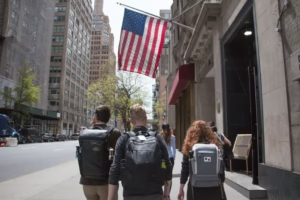For Indian students aspiring to pursue higher education in the United States, navigating the financial landscape can often feel overwhelming.
The dream of studying abroad, particularly in a country renowned for its academic excellence, like the USA, is attainable with careful planning and awareness of available resources. Fortunately, numerous US government scholarships for Indians exist to alleviate the financial burden and transform aspirations into reality. These scholarships not only offer crucial financial assistance but also present invaluable opportunities for academic enrichment and cross-cultural understanding.

What are the main government scholarships for Indians to study in the US?
The US government is dedicated to fostering international educational exchange and offers a diverse portfolio of scholarships specifically for international students, including those from India. Perhaps the most prestigious and well-known are the Fulbright-Nehru Fellowships. Other significant options include the Hubert H. Humphrey Fellowship Program and various grants administered through organizations affiliated with the US Department of State.
These scholarships aim to promote mutual understanding and collaboration between the US and other countries through academic and cultural exchange. Besides federal funding, some scholarships may also be offered by states or individual universities. Given the highly competitive nature of admissions to US universities, exploring every possible avenue for funding is crucial. Personalized guidance on identifying and applying for scholarships that closely align with your individual academic profile and financial requirements can make all the difference.
Top 5 US Government Scholarships Every Indian Student Should Know About:
Fulbright-Nehru Fellowships:
- The Fulbright-Nehru Fellowships stand as one of the most prestigious and comprehensive scholarship programs available to Indian students. These fellowships are meticulously administered by the United States-India Educational Foundation (USIEF), ensuring a high level of quality and integrity. The program provides a wide spectrum of opportunities tailored to Indian students, scholars, and professionals at various stages of their academic and professional journeys. Also, these opportunities encompass support for graduate studies, advanced research, teaching positions, and participation in professional development activities.
- The Fulbright program places significant emphasis on both academic excellence and the cultivation of cross-cultural understanding, rendering it a highly selective and widely respected scholarship. The rigorous selection process ensures that only the most qualified and culturally sensitive candidates are chosen to represent their country. Successfully securing a Fulbright-Nehru Fellowship can dramatically enhance your academic and professional prospects, opening doors to future opportunities and collaborations. Its holistic approach ensures that individuals gain not just financial aid but also a platform to engage with global communities and foster understanding.
Hubert H. Humphrey Fellowship Program:
- The Hubert H. Humphrey Fellowship Program is a non-degree initiative for seasoned professionals seeking to enhance leadership skills. It combines academic study with hands-on professional development activities conducted in the United States. The program focuses on critical fields such as sustainable development, democratic institution building, public health, education improvement, and technology-driven global solutions.
- This Fellowship presents an unparalleled opportunity for participants to acquire practical experience in their respective fields, broaden their perspectives on global issues, and cultivate a robust global network of professionals. Participants not only enhance their skill sets but also contribute to solutions for pressing global problems. The program promotes collaboration and knowledge sharing across borders, equipping participants to become effective leaders and agents of positive change within their communities and beyond.
Foreign Fulbright Student Program:
- This program provides opportunities for graduate students, young professionals, and artists from across the globe, including India, to undertake studies and conduct research within the United States. Operating in over 160 countries worldwide, the program serves as a crucial bridge for international academic exchange. The Foreign Fulbright Student Program is committed to supporting a diverse array of academic disciplines. It ensures that individuals from various fields have the chance to pursue their scholarly interests.
- This particular aspect makes the program exceptionally beneficial for Indian students who are actively seeking admission to a specific graduate program offered at a US university. The program’s flexibility allows students to tailor their studies and research to their individual goals and aspirations. Through the program, students can gain access to top-tier educational resources, collaborate with renowned faculty, and contribute to cutting-edge research, enriching both their academic and professional trajectories. The program strengthens international ties and fosters a spirit of collaboration among scholars from diverse backgrounds.
East-West Center Scholarships:
- It is important to clarify that while the East-West Center is not strictly classified as a “US government” scholarship program in the same way as the Fulbright programs, it does receive substantial federal funding and is dedicated to promoting academic and cultural exchange initiatives between the United States and countries located within the Asia-Pacific region. Indian students who are focusing their studies on topics or issues related to the Asia-Pacific region may find that there are relevant scholarship opportunities available through the East-West Center.
- These scholarships can therefore provide valuable financial assistance and access to resources that support academic pursuits. Consequently, interested students are encouraged to explore the East-West Center’s website and program offerings to see if they qualify for any available scholarships. Moreover, focusing on Asia-Pacific studies helps advance global understanding and collaboration, thereby fostering a deeper appreciation of diverse cultures and perspectives.
Am I eligible for the prestigious Fulbright-Nehru Master’s Fellowship?
Eligibility for the Fulbright-Nehru Master’s Fellowship depends on academic qualifications, professional experience, and English proficiency. Applicants generally need a Bachelor’s degree from a recognized institution. A strong academic record demonstrating dedication and aptitude in their field is also required. Applicants must have strong written and verbal communication skills to convey ideas and engage in scholarly discussions. A clear understanding of career goals is essential, showing long-term vision and commitment to their field.
The USIEF website provides complete details on eligibility and application guidelines for the Fulbright-Nehru Master’s Fellowship. Meeting minimum requirements does not guarantee selection, as the program attracts a highly competitive applicant pool. We can help assess your eligibility and create a compelling application that highlights your strengths and potential, boosting your chances of success.
Do these scholarships cover full tuition and living expenses?
The coverage of US government scholarships varies depending on the program. For example, some scholarships, like Fulbright-Nehru Fellowships, provide full funding for tuition, living expenses, travel, and health insurance. This comprehensive support, in turn, reduces financial stress, allowing students to focus fully on academics. Conversely, other scholarships may offer only partial funding, covering tuition or some living costs, which therefore requires careful financial planning by the student.
It is therefore crucial to carefully review each scholarship’s terms to understand the financial support offered. By knowing the coverage, you can better plan your finances, create a realistic budget, and avoid unexpected study costs. Additionally, our counseling services can help you develop a budget and explore extra funding options, such as grants or loans. These resources, in turn, can supplement your scholarship and ensure you have sufficient funds for your education.
Where and when is the application deadline for these scholarships?
Application deadlines for US government scholarships usually fall between late spring and late summer, but dates can vary. For instance, Fulbright-Nehru Fellowships typically have deadlines in May or June for the following academic year. Due to these variations, it is crucial to regularly check official scholarship websites for accurate deadlines and application procedures. Relying on outdated information or inaccurate assumptions can be detrimental to your application.
Missing an application deadline can severely reduce your chances of receiving funding. To stay organized, we maintain a detailed database of scholarship deadlines. We also provide timely reminders so you never miss important opportunities. Proactive planning and careful organization are paramount to achieving a successful scholarship application process. An effective organization includes creating a detailed timeline, gathering all necessary documents, and seeking guidance from experienced advisors.
Studying in the USA is an incredible opportunity, and these scholarships for Indians can make it a reality. Remember to thoroughly research each scholarship for Indian students in the USA, paying close attention to eligibility requirements and application deadlines. Programs like the Fulbright Nehru scholarship and others offering funding for study in the USA are highly competitive, so preparation is key. For personalized guidance and expert assistance in navigating the complexities of the application process, contact our counseling service today.
We can help you identify the best US government scholarships for Indians to match your profile and maximize your chances of success. Don’t let financial concerns hold you back from pursuing your dreams – let us help you unlock the door to a world-class education.
Contact IMFS today for personalized guidance on your study abroad plans.
Study in the USA: 5 Exclusive Government Scholarships for Indian Students – FAQs
1. What are the top U.S. government scholarships for Indian students?
The most prestigious U.S. government-funded scholarships available to Indian students are:
- Fulbright-Nehru Master’s Fellowships – For exceptional Indians pursuing a master’s degree in the U.S. in fields such as public administration, journalism, arts, environmental studies, or gender studies.
- Fulbright-Nehru Doctoral Research Fellowships – For Indian PhD candidates to conduct part of their research in U.S. institutions.
- Fulbright-Nehru Postdoctoral Fellowships – For Indian faculty and researchers with a PhD, to undertake postdoctoral studies in the U.S.
- Hubert H. Humphrey Fellowship Program – A non-degree fellowship that provides mid-career professionals with opportunities to enhance their leadership skills and gain practical U.S. experience.
- Fulbright-Kalam Climate Fellowship – Focused on addressing climate change issues, for Indian researchers in environmental and sustainability-related areas.
Each program is highly competitive and fully/partially funded, with benefits extending far beyond financial aid.
2. Who is eligible to apply for these scholarships?
Eligibility criteria vary by program, but generally, applicants must:
- Be Indian citizens residing in India at the time of application.
- Have an excellent academic record (minimum 55%+ in relevant degrees).
- Possess leadership potential and a record of community service or professional achievements.
- Show a clear purpose of study/research and its impact on India’s development.
- Demonstrate English language proficiency (TOEFL or IELTS is often required).
- For certain fellowships (like Humphrey), applicants must have at least 5 years of professional experience.
3. Do these scholarships cover all expenses?
Most of these scholarships are fully funded, which means they include:
- Tuition fees at U.S. universities.
- Living allowance/stipend to cover accommodation, food, and daily costs.
- Round-trip economy airfare between India and the U.S.
- Accident and sickness coverage.
- Additional support for books, research, and conferences in some cases.
Some fellowships (like Humphrey) also provide professional networking opportunities, internships, and study tours across the U.S.
4. When should I start preparing my application?
Applicants should begin preparations at least 12–15 months in advance of their intended start date.
- Application windows typically open between January and March.
- Deadlines usually fall between June and July of the year before the program begins.
Early preparation is crucial because applications require a well-structured Statement of Purpose (SOP), research proposals, and strong letters of recommendation—all of which take time to craft.
5. Do I need U.S. university admission before applying?
For most scholarships, such as Fulbright programs, you do not need to secure admission in advance. If selected, the scholarship body coordinates placement at a suitable U.S. university based on your academic and research profile.
However, for certain research-oriented fellowships, applicants may need to identify and secure an affiliation with a U.S. professor or institution before applying.
Post-Study & Career FAQs
6. Can I work in the U.S. after completing my scholarship program?
Work opportunities depend on the specific scholarship terms. Most U.S. government scholarships—especially Fulbright programs—include a two-year home residency requirement. This means scholars must return to India after completing their program before applying for long-term U.S. work visas (like H-1B).
However, students who pursue a degree-based program may be eligible for OPT (Optional Practical Training) if they are on an F-1 visa. OPT allows temporary work in the U.S. after graduation.
7. What is OPT and how does it benefit international students?
Optional Practical Training (OPT) is a U.S. work authorization program that allows international students to work in their field of study after completing their degree.
- Standard OPT: 12 months of work authorization.
- STEM OPT Extension: An additional 24 months for students in Science, Technology, Engineering, and Math programs (total 36 months).
OPT helps students gain hands-on industry experience and often acts as a stepping stone toward an H-1B visa sponsorship.
8. Can scholarship students apply for H-1B after their program?
Yes, scholarship recipients are eligible to apply for an H-1B work visa after their studies. However:
- Fulbright and similar U.S. government-funded scholars must return to India for at least two years before they can change their visa status.
- After fulfilling this requirement, they can apply for H-1B sponsorship from U.S. employers.
In rare cases, students can request a waiver of the two-year rule, but this requires strong justification and government approvals.
9. What career advantages do these scholarships offer after returning to India?
Completing a U.S. government scholarship provides a massive career boost, including:
- Strong academic reputation and credentials from U.S. institutions.
- Global networking with alumni, researchers, and policymakers.
- Better opportunities in academia, NGOs, think tanks, government policy, and corporate sectors.
- Higher chances of securing leadership roles and international assignments.
- Recognition in both Indian and global job markets as a Fulbright alumnus/alumna or equivalent.
10. Are there exceptions to the ‘return to India’ rule?
Yes. A waiver of the two-year home residency requirement can be requested in limited cases, such as:
- If the student has a U.S. employer willing to sponsor their visa.
- If returning to India would cause exceptional hardship.
- If the student’s work is deemed in the national interest of the U.S.
However, approval requires clearance from both U.S. and Indian authorities, making it a challenging route.
11. How do these scholarships affect long-term immigration plans?
While government scholarships are not direct immigration pathways, they:
- Strengthen your profile for future visa or green card applications.
- Provide global credibility in academics, research, or professional fields.
- Make you highly attractive to U.S. employers and international organizations once the return obligation is completed.
- Create long-term opportunities for joint U.S.-India projects, global research funding, and international careers.
In short, even though immediate immigration may be restricted, these scholarships act as career accelerators with lasting benefits.





